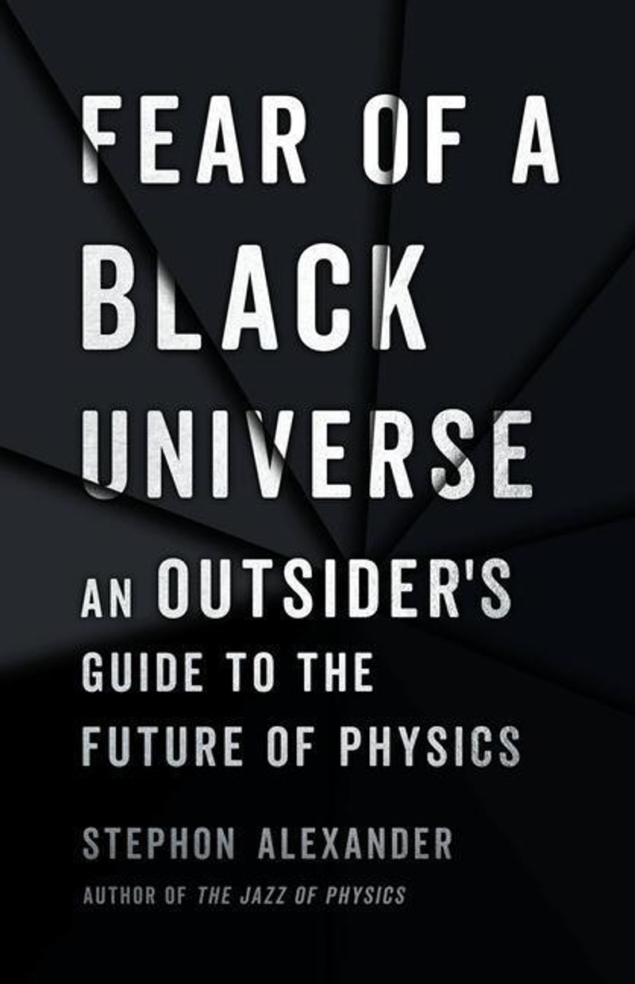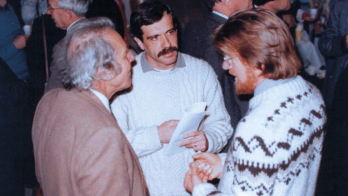
Stephon Alexander is a professor of theoretical physics at Brown University, specialising in cosmology, particle physics and quantum gravity. He is also a self-professed outsider, as the subtitle of his latest book Fear of a Black Universe suggests. His first book, The Jazz of Physics, was published in 2016. Fear of a Black Universe is a rallying cry for anyone who feels like a misfit because their identity or outside-the-box thinking doesn’t mesh with cultural norms. By interweaving historical anecdotes and personal experiences, Alexander shows how outsiders drive innovation by making connections and asking questions insiders might dismiss as trivial.
Alexander is Black and internalised his outsider sense early in his career. As a postdoc in the early 2000s, he found that his attempts to engage with other postdocs in his group were rebuffed. He eventually learned from his friend Brian Keating, who is white, the reason why: “They feel that they had to work so hard to get to the top and you got in easily, through affirmative action”. Instead of finding his peers’ rejection limiting, Alexander reinterpreted their dismissal as liberating: “I’ve come to realise that when you fit in, you might have to worry about maintaining your place in the proverbial club… so I eventually became comfortable being the outsider. And since I was never an insider, I didn’t have to worry that colleagues might laugh at me for my unlikely approach.”
Instead of finding his peers’ rejection limiting, Alexander reinterpreted their dismissal as liberating
Alexander argues that true breakthroughs come from “deviants”. He draws parallels between outsiders in physics and graffiti artists, who were considered vandals until the art world recognised their talent and contributions. Alexander recounts his own “deviance” in a humorous and sometimes self-deprecating manner. He recalls a talk he gave at a conference about his first independent paper, which involved reinterpreting the universe as a three-dimensional membrane orbiting a five-dimensional black hole. During the talk he was often interrupted, eventually prompting a well-respected Indian physicist to stand up and shout “Let him finish! No one ever died from theorising.”
Alexander took these words to heart, and asks his readers to do the same during the speculative discussions in the second part of his book. Here, Alexander intersperses mainstream physics with some of his self-described “strange” ideas, acknowledging that some readers might write him off as an “oddball crank”. He explores the intersection of physics with philosophy, biology, consciousness, and searches for extraterrestrial life. Some sections – such as the chapter on alien quantum computers generating the effect of dark energy – feel more like science fiction than science. But Alexander reassures readers that, while many of his ideas are strange, so are many experimentally verified tenants of physics. “In fact, the likelihood that any one of us will create a new paradigm because we have violated the norms… is very slim” he observes.
Science wise, this book is not for the faint-hearted. While many other public-facing physics books slowly wade readers into early-20th-century physics and touch on more abstract concepts only in the final chapters, part I of Fear of a Black Universe dives directly into relativity, quantum mechanics and emergence. Part II then launches into a much deeper discussion about supersymmetry, baryogenesis, quantum gravity and quantum computing. But the strength of Alexander’s new work isn’t in its retellings of Einstein’s thought experiments or even its deconstruction of today’s cosmological enigma. More than anything, this book makes a case for cultivating diversity in science that goes beyond “gesticulations of identity politics”.
Fear of a Black Universe is both mind-bending and refreshing. It approaches physics with a childlike curiosity and allows the reader to playfully contemplate questions many have but few discuss for fear of sounding like a crank. This book will be enjoyable for scientists and science enthusiasts who can set cultural norms aside and just enjoy the ride.







